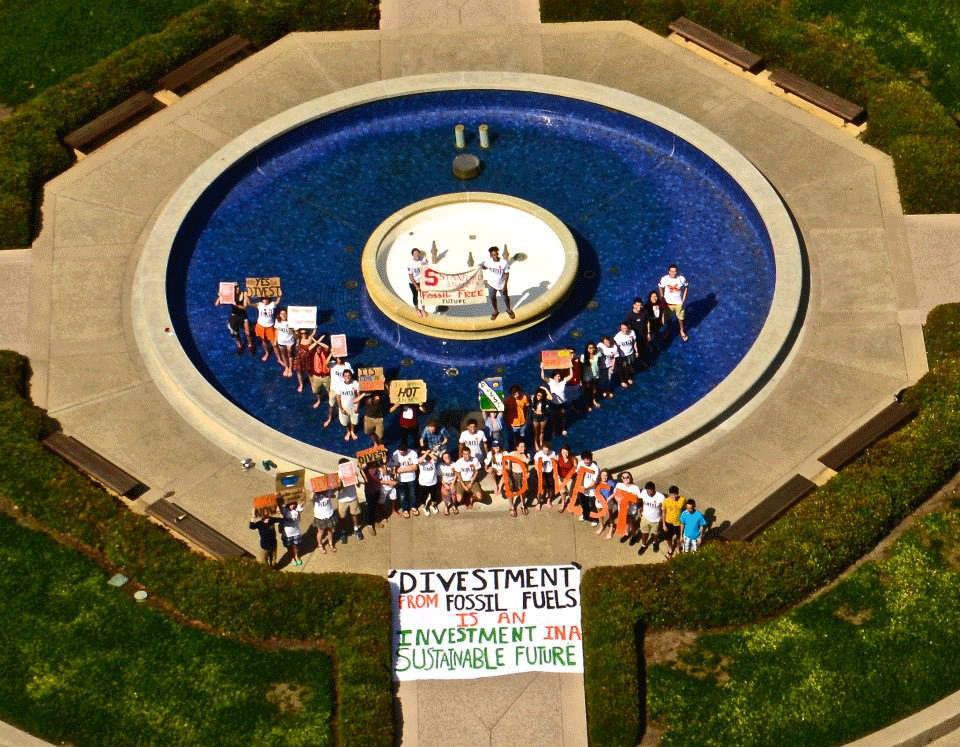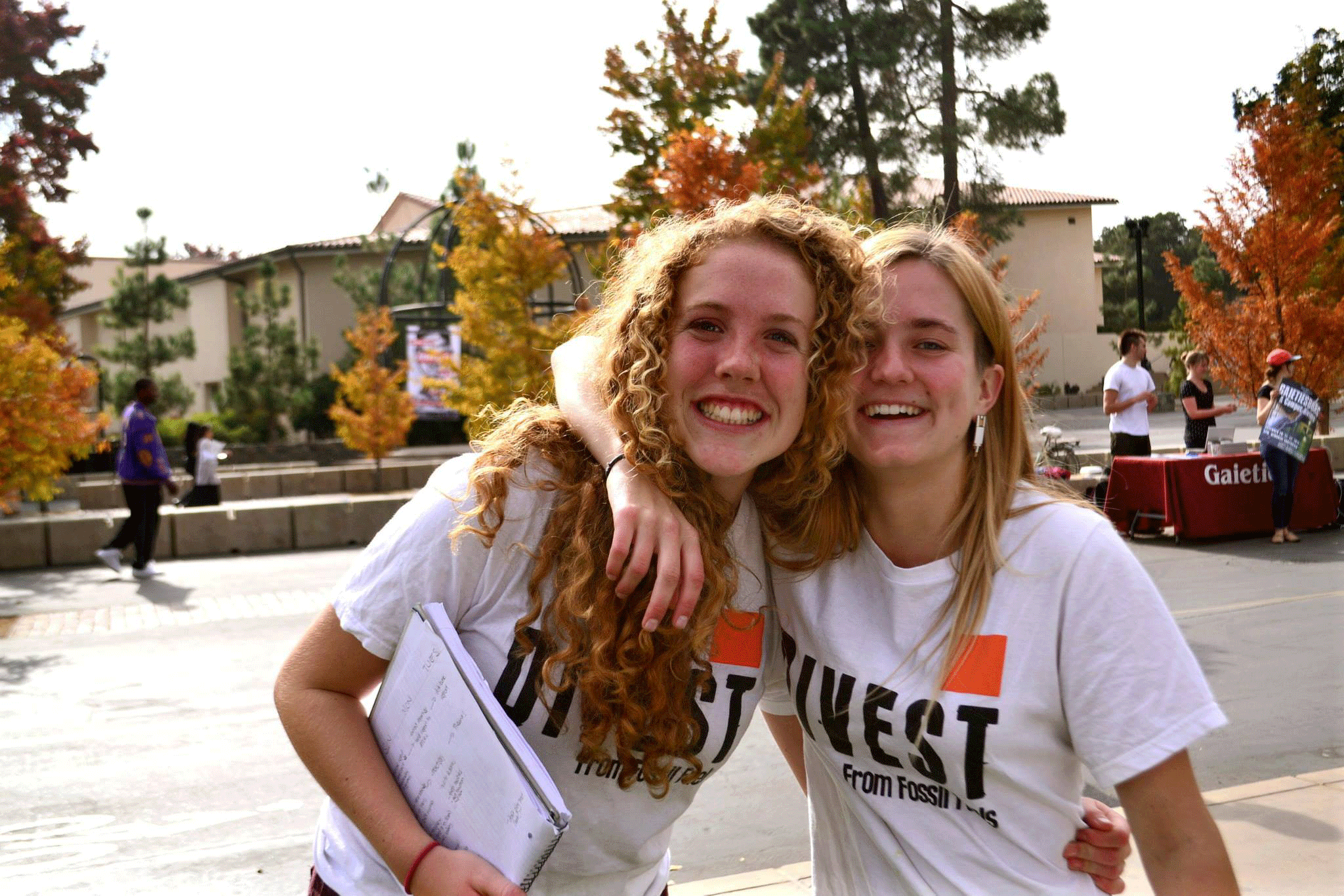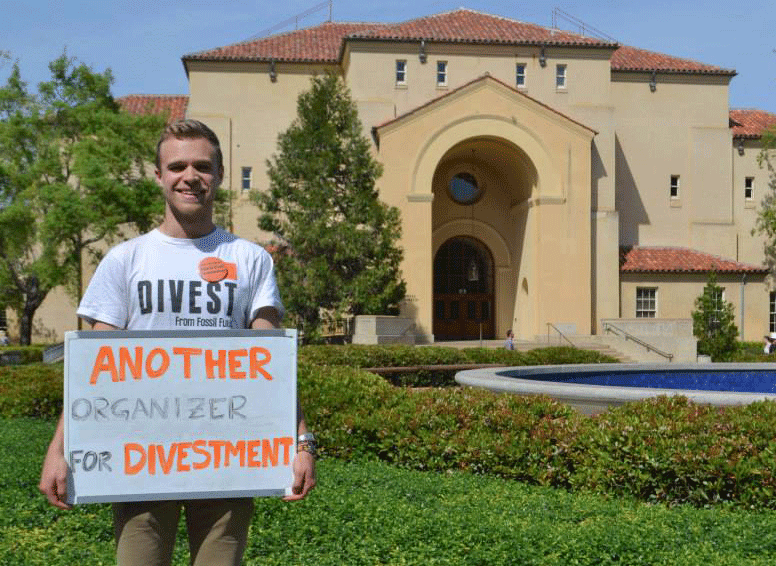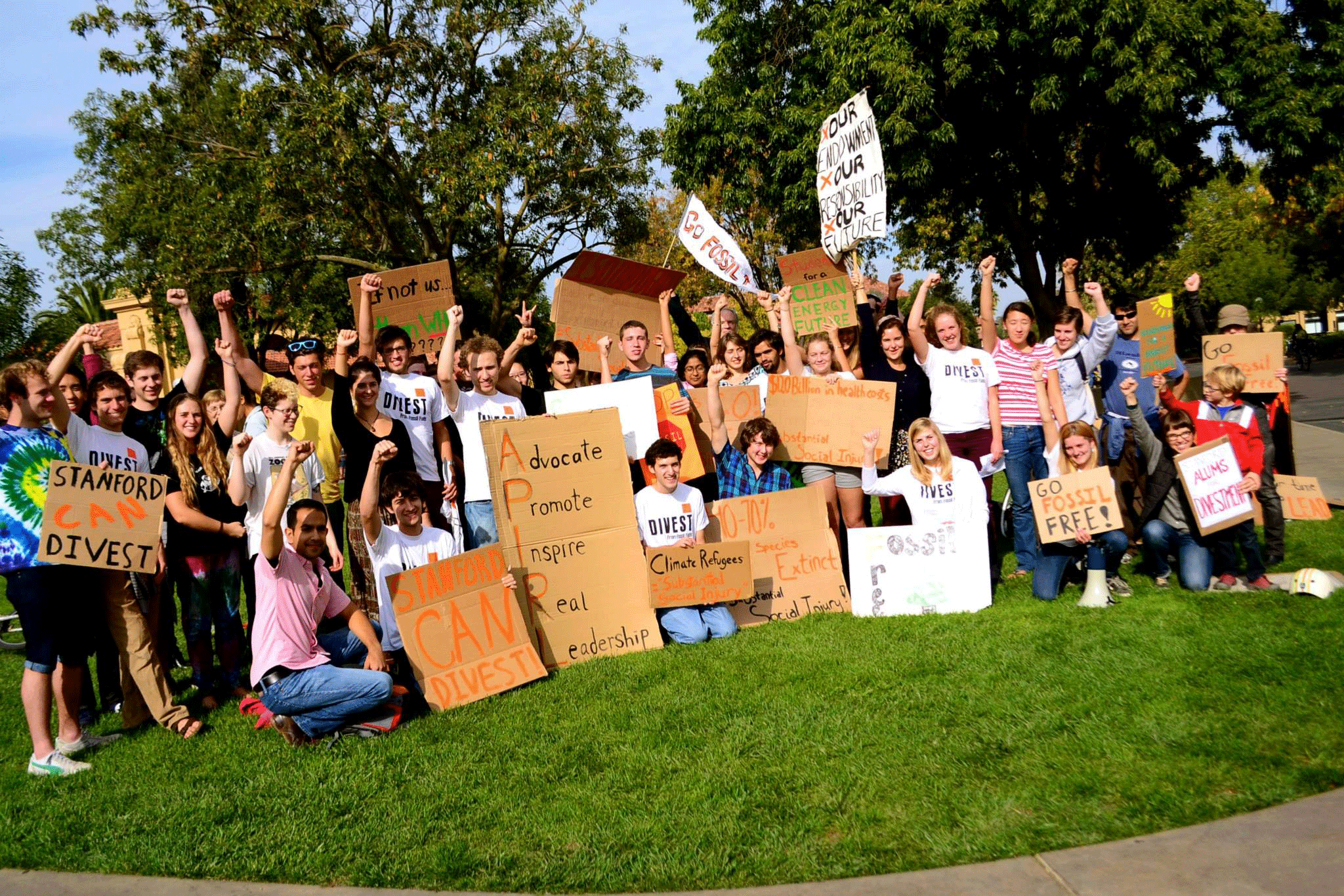Stanford Divests from Coal
Air Date: Week of May 9, 2014

Stanford’s student activists demanding their school divest from fossil fuels (photo: Fossil Free Stanford)
Stanford University has given the divestment movement a huge boost by promising to pull their 18 billion dollar endowment from coal companies. Student activist Michael Peñuelas tells host Steve Curwood that he’s proud of his University, but the students will keep pushing for divestment from all fossil fuels.
Transcript
CURWOOD: From the Jennifer and Ted Stanley Studios in Boston and PRI, this is Living on Earth. I’m Steve Curwood. Stanford University will divest its $18 billion endowment of holdings in coal companies - a major victory for the rapidly growing fossil fuel divestment movement. Stanford is the first major university to acknowledge its investments contribute to climate disrup-tion, and it joins 11 colleges, and a number of cities and foundations that have already divested.
The announcement came within days of the arrest of students demanding divestment at Washing-ton and Harvard universities. Stanford President John Hennessy called moving away from coal investments ”a small but constructive step” and pledged to keep working to develop viable sus-tainable energy solutions for the future. Well, divestment activists are thrilled. Stanford junior Michael Penuelas, a lead student organizer, explained how the breakthrough happened.
PENUELAS: Stanford's Board of Trustees passed a vote with a majority sufficient to divest Stanford from coal, so what that means is they're going to cease all direct investments in pretty much a list of about the 100 biggest coal companies. They're not going to make any future in-vestments in those either.
CURWOOD: What about mutual funds that have coal? Maybe just as a small part?
PENUELAS: Yes, so mutual funds and indices make up the majority of Stanford's endowment. Big endowments in general are going to be under various contractual obligations, so they can't just go ahead and divest immediately, is what it sounds like to us, but they're going to go ahead and pressure those as strongly as they can to go ahead and do what they can, those external asset managers, to pull Stanford's money out.
CURWOOD: To what extent were you inside the room during this assessment by Stanford on the question of divestment?

Stanford student activists (photo: Fossil Free Stanford)
PENUELAS: So our campaign submitted a formal request for review to an advisory panel com-posed of faculty, staff, students and alumni as well last spring. Since then, we've met with vari-ous elements of that panel and other administrators about once every two weeks, or once a week, while they've been conducting an extensive research and deliberation process. About two weeks ago, they notified us that it had passed on to the Board of Trustees. There's a subcommittee there that then made a bigger recommendation to the board itself.
CURWOOD: What was your dialogue like with the university through this process?
PENUELAS: Very amiable and very constructive. We've actually been struck particularly when you look at the actions that other administrations have taken. For example, in the last week or so, students have been arrested on the campuses of Harvard and Washington University for the same push. So, you know, in light of that, when you look at it from that kind of juxtaposition, quite fantastic.
CURWOOD: Now, your group, Fossil Free Stanford, was calling on the university to divest from all fossil fuels. How satisfied are you with this step?

Michael Peñuelas, Junior at Stanford (photo: Fossil Free Stanford)
PENUELAS: We're pretty proud of Stanford. This marks the biggest endowment, $18.7 billion, that is now off the table when it comes to investments in coal. We'll certainly keep pushing be-cause tar sands is just as dirty as coal when it comes to carbon, but also oil and natural gas, they're also contributing enormously to climate change, and it's largely a similar group of com-panies that are controlling those reserves. And what Stanford made its decision on was the fact that the climate change caused by coal is causing substantial enough --"social injury" was the wording that they used, to warrant action on those investments. And in our opinion, all of the other drivers of climate change are also causing that same social injury. We're going to keep this dialogue going, we're going to keep working with this review panel, this advisory panel, and ul-timately, we're going to really hope for divestment. And this is a promising sign.
CURWOOD: Now, a cynic might say that's Stanford's move was simply a smart financial move given how coal stocks have fallen. The biggest company, Peabody Coal, was $75 just three years ago, $75 a share, and is now down in the teens.
PENUELAS: I certainly think that was a major factor in Stanford's decision. Fossil fuels, as car-bon legislation rolls out across the globe and as people realize that there are feasible alternatives, are going to decrease in value. There's this concept of a carbon bubble that's being discussed widely in financial circles right now, and so I think frankly, I think it makes good financial sense. There have been some studies that have shown if universities had divested ten years ago, they would have significantly higher returns today. It's just fact these industries are on the way out, coal particularly in the US, but all of these fossil fuel industries. So, I think that's a perfectly good reason. If universities want to divest - on financial grounds - then you know what, that's good by me.
CURWOOD: How much money do you think Stanford had invested in coal when this ruling went down?
PENUELAS: Stanford being a private institution, they don't have to disclose where their invest-ments go for the most part - and they don't - but President John Hennessy did state that it’s not a very big chunk, the direct investments they're going to rid themselves of immediately. So it's not the biggest financial impact that it could have been, but it's certainly something, and more than anything it's certainly a symbolic statement that Stanford on an institutional level is done with coal. Coal, it's the most carbon-intensive fossil fuel. The largest fossil fuel reserves on Earth are coal reserves, and it's the fossil fuel with the most rapid increase in the rate of exploitation in countries around the world, so a move away from coal on the part of Stanford is a leading and a really major step in the move away from the fossil fuel industry.

78% of the Stanford student body supports full fossil fuel divestment (photo: Fossil Free Stanford)
CURWOOD: What's the importance of this coal divestment by Stanford in terms of the national divestment movement, do you think?
PENUELAS: The responses we've been getting on Facebook and other forms of social media as well as a hundred emails we've received so far from other student organizers have been ecstatic. This is one of the first really big wins. This is 18.7 billion reasons why we need to keep moving, and we need to keep pushing. So a lot of those campaigns are galvanized by this because espe-cially in the light of, again, these arrests at Harvard and Washington university have been really depressing and a sad week for the movement, because these universities chose instead of opening dialogue with their students to arrest them. So I think this comes at a very important time, and this is going to be a very crucial action when we look back at this movement in the future.
CURWOOD: Michael Penuelas is a junior at Stanford University and a lead student organizer for the Fossil Free Stanford movement. Michael, thanks so much for taking the time today.
PENUELAS: Yeah, I really appreciate your time. Thank you.
Links
Living on Earth wants to hear from you!
Living on Earth
62 Calef Highway, Suite 212
Lee, NH 03861
Telephone: 617-287-4121
E-mail: comments@loe.org
Newsletter [Click here]
Donate to Living on Earth!
Living on Earth is an independent media program and relies entirely on contributions from listeners and institutions supporting public service. Please donate now to preserve an independent environmental voice.
NewsletterLiving on Earth offers a weekly delivery of the show's rundown to your mailbox. Sign up for our newsletter today!
 Sailors For The Sea: Be the change you want to sea.
Sailors For The Sea: Be the change you want to sea.
 The Grantham Foundation for the Protection of the Environment: Committed to protecting and improving the health of the global environment.
The Grantham Foundation for the Protection of the Environment: Committed to protecting and improving the health of the global environment.
 Contribute to Living on Earth and receive, as our gift to you, an archival print of one of Mark Seth Lender's extraordinary wildlife photographs. Follow the link to see Mark's current collection of photographs.
Contribute to Living on Earth and receive, as our gift to you, an archival print of one of Mark Seth Lender's extraordinary wildlife photographs. Follow the link to see Mark's current collection of photographs.
 Buy a signed copy of Mark Seth Lender's book Smeagull the Seagull & support Living on Earth
Buy a signed copy of Mark Seth Lender's book Smeagull the Seagull & support Living on Earth

